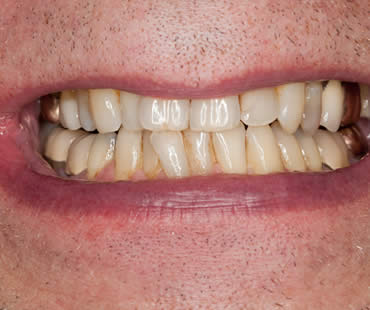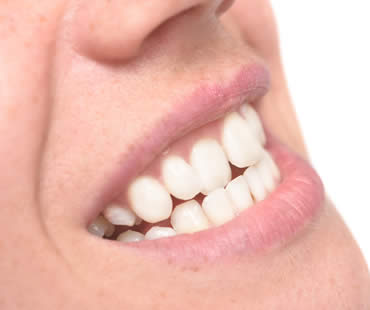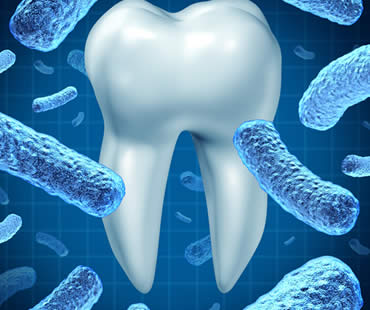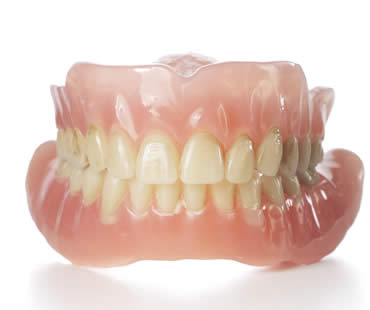
Plaque is your mouth’s enemy. It is a film of bacteria that forms on your teeth, and produces acid as it mixes with sugar from foods and drinks you consume. Over time, these acids destroy your tooth enamel and lead to decay. Plaque can also form under your gums and affect both the gum tissue and the bones supporting your teeth.
So how can you avoid getting the plaque that causes these problems? Here are some helpful tips.
Brush
Use a fluoride toothpaste to brush your teeth at least twice a day. Choose a soft-bristled toothbrush and brush all of your tooth surfaces, as well as your tongue.
Floss
As much as many people don’t want to, flossing your teeth every day is important in getting rid of plaque between your teeth and at your gum line.
Eat healthy foods
Some foods help keep plaque off your teeth. Munch on apples, cucumbers, carrots, and other raw vegetables and fruits. Crunchy foods like these will help clean your teeth while filling you up and giving you helpful nutrients.
Avoid junk food
On the other hand, limit the amount of junk food that you eat. Sugary drinks and foods introduce sugar into your mouth that will stick to your teeth and lead to plaque formation.
See your dentist
Even if you practice good oral hygiene, some amount of plaque usually forms. It hardens to become tartar, which can only be properly removed by your dentist. Dental checkups every six months will help you keep plaque under control, and a healthy smile on your face.
If you live in the Lawrence MA area contact us today

Life can be full of frustrations, demands, deadlines, and inconveniences. For lots of people, stress is a way of life. The problem is that when you’re constantly stressed out, your health can pay the price. There are many health conditions that are caused or worsen due to high stress levels, but did you know that your mouth may be affected in the form of teeth grinding?
What is teeth grinding?
The condition of grinding or gnashing your teeth together is called bruxism, and often includes clenching your jaw. It commonly happens while sleeping, so that you may not even realize you’re doing it. Sometimes a sleeping partner hears it, or your dentist may recognize the signs of unusual wear on your teeth.
What does my stress level have to do with it?
Teeth grinding has been linked to stress and anxiety. Studies have shown that people who are stressed from daily life and don’t have adequate coping methods are more likely to grind their teeth. Experts say that both adults and children facing stress sometimes cope by grinding their teeth.
How does teeth grinding affect me?
Grinding your teeth has more negative effects than you might think. It often causes headaches, earaches, and sleep problems. It can cause chipped, loose, cracked, or sensitive teeth. Tooth enamel can suffer excessive wear, and gum tissue may be damaged. Teeth grinding also often causes a painful jaw disorder of the temporomadibular joint, commonly called TMJ.
What can I do about it?
Your dentist may recommend wearing an over-the-counter or custom mouthguard at night, to protect your teeth from further damage. Medications usually are not helpful, although a muscle relaxant before bed may help prevent jaw clenching. The ideal treatment is to try to reduce or eliminate stress that may be contributing to your teeth grinding. Relaxation therapy, stress management, corrective exercises, and counseling are some of the options that dentists suggest to help you remedy the problem.
If you need a dentist in Lawrence MA contact us today

Any stage of gum disease (or gingivitis) can cause inflammation, pain, and sensitivity. It can make eating and talking difficult. It’s important to know what causes gum disease and what can happen if it develops, so that you can avoid it altogether or at least catch it before it wreaks havoc on your mouth.
What causes gingivitis?
Plaque buildup is the main cause of gum disease, although other factors can lead to it as well. These include:
- Illnesses, especially those that interfere with your immune system. Patients with HIV, diabetes, and cancer are often at higher risk for gingivitis.
- Hormonal changes associated with pregnancy, menstruation, puberty, and menopause.
- Some medications affect oral health by decreasing saliva or causing abnormal growth of gum tissue.
- Smoking can hamper the healing of your gums.
- Poor dental hygiene, including neglecting brushing or flossing, or using improper techniques.
- Family history of gum disease.
What are the symptoms?
Gingivitis can sneak up without symptoms, even in the later stages of the disease. However, there are signs that may point to some level of gingivitis. These include bleeding, red, or swollen gums. Ongoing bad breath and receding gums are other symptoms. Deep pockets may form between the teeth and gums, and teeth may shift or loosen. You might also notice changes in how your teeth fit together when you bite down. Your dentist can recognize symptoms even if you don’t, so make sure you have checkups regularly.
How is gingivitis treated?
Treatment depends on the stage of your gum disease, how you responded to previous treatment, and your general health. Treatments range from therapies to control bacterial growth to surgery to restore gum tissue. Often gingivitis can be controlled with dental visits and good dental hygiene.
What can happen without treatment?
Gingivitis may advance to periodontitis, causing permanent damage to your mouth. Advanced gum disease has been linked to stroke, heart disease, rheumatoid arthritis, and diabetes complications.
If you live in the Lawrence MA area contact us today

There are a number of reasons that dentists or oral surgeons recommend surgery, but facial injuries are probably the most unexpected and alarming cause. Maxillofacial injury, or facial trauma, refers to any injury to the mouth, jaw, and face. Most of these injuries result from sports, car accidents, job accidents, violence, or an accident at home. Let’s learn about oral surgery resulting from facial trauma.
Broken bones are a common type of serious facial injury. Fractures can occur in the upper or lower jaw, cheekbones, palate, and eye sockets. Injuries in these locations may affect vision and the ability to eat, talk, and breathe. Hospitalization is often required for treatment, which is similar to that for fractures in other parts of the body. The bones must be lined up and held in place to allow time to heal them in the correct position. Because casts are not possible in facial injuries, the surgeon may use wires, screws, or plates to treat fractures. Sometimes healing takes as long as six weeks or more.
Even though some facial injuries are worse than others, all of them should be taken seriously. They affect an important area of the body, so it is recommended to seek treatment from an oral surgeon to make sure you receive optimum care. Even if stitches are all that’s required, it’s best to have them performed by an oral surgeon who can place them exactly as needed to produce the best results.
It’s no surprise that the best solution for facial injuries is to prevent them in the first place. Oral surgeons suggest consistent use of mouth guards, seat belts, and masks and helmets as required. Improvements have been made to safety gear to make these items more comfortable and efficient, so there should be no excuses for not using them to protect yourself and avoid injuries that can lead to oral surgery.
We look forward to seeing you in our Lawrence MA dental office

Have you lost all or most of your teeth due to damage, disease or decay and don’t find traditional removable dentures an attractive option? Implant-supported hybrid dentures are an alternative to traditional dentures that provide a secure and stable prosthetic replacement for missing teeth by combining the benefits of a fixed replacement with the advantages of a removable denture. Hybrid dentures are an especially viable option for patients who have lost a large amount of jawbone due to missing teeth. Some of the benefits of hybrid dentures include:
- Hybrid dentures save your natural roots and preserves bone while reducing bone resorption and deterioration.
- Hybrid dentures help to control facial contour changes caused by missing teeth.
- Hybrid dentures function more naturally, allowing you to chew food better and speak more clearly.
- With hybrid dentures, there is no need for messy denture creams and adhesives, eliminating much of the embarrassment associated with loose dentures.
- Hybrid dentures eliminate the slippage, clacking and loss of taste associated with traditional dentures.
If you would like fixed teeth to replace teeth that you have lost but are not ready or a candidate for multiple individual implants for each missing tooth, hybrid dentures could be your solution. Hybrid dentures require only a few dental implants to secure the new teeth in place, allowing for quicker recovery time and increased comfort.
If you are seeking an alternative to traditional dentures to replace your missing teeth, talk with your dental professional to determine if you are a good candidate for hybrid dentures. With hybrid dentures, you can successfully restore the look, feel, and function of your natural teeth.
If you live in the Lawrence MA area contact us today

With an estimated 49 million adults in the United States wearing dentures, there are lots of lessons learned about wearing them. Virtually everyone will say that it took a little adjustment time before they were comfortable and confident with their new teeth. It can help to know what to expect with wearing dentures at first.
Your dentures may feel very strange the first day you get them. They can seem too big for your mouth, and as though your lips are out of place. These strange sensations will disappear with time. You may also notice more saliva than usual in your mouth. This is a natural response of your mouth as it grows accustomed to the appliance.
A liquid diet is recommended by many dentists for the first couple of days after getting dentures. Then you may begin eating soft foods, like cooked vegetables, eggs, and fish. Take small bites and chew slowly. Avoid biting into foods with your front teeth.
Mouth soreness from your dentures should go away after a few days. If it lasts longer than a week, call your dentist to ask if you should be seen. You may experience minor mouth sores for the first couple of weeks that you wear dentures. This is normal as you give your mouth time to adjust. If the sores are severe, call your dentist.
Dentists recommend that you remove your dentures for a minimum of eight hours each day to give your gums a rest. Most patients do this at night while sleeping. Your dentist will provide instructions about how to care for your dentures and where to store them when not wearing them. Be sure to follow the instructions for care to ensure that your dentures last as long as possible.
If you live in the Lawrence MA area contact us today










